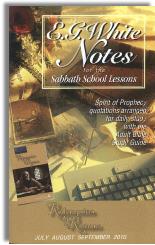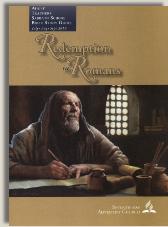|
||||||||||||||
Commentary on "Victory Over Sin"
Day 5: Wednesday, August 18, 2010 - The Man of Romans 7
Overview
Now we come to the question implied by the title of this week’s lesson. What kind of man is speaking in this chapter? The lesson answers, a man who is serving sin. Often times, the Holy Spirit shows a believer his need of Christ by giving him an “old covenant” experience, where he tries to gain favor with God through keeping the law in his own strength. He fails because he is not renewing his dedication to Christ on a daily basis. When we fail to dedicate ourselves this way, we will effectually serve sin.
Many Christians live in failure because they rationalize that their sanctification is incomplete, and a certain level of failure is acceptable. The lesson states that “instead of taking their known sins to Christ and asking for victory, they hide behind Romans 7.” These Christians believe that Romans 7 teaches the Christian’s enslavement to sin and the impossibility to do right.
Observations
The lesson has now clearly stated that the man of Romans 7 is someone who is enslaved to sin, who is not connected to Christ, and is not achieving the victory found in chapters 6 and 8. He is therefore living as a “carnal Christian,” someone who became a Christian at some point in life, but is staying connected.
Is the man of Romans 7 following Christ? Let’s look at the evidence. First, Paul speaks of himself as only a believer can:
“For I know that nothing good dwells in me, that is, in my flesh.”
One characteristic that marks the unconverted soul is the belief that he is innately good. Before his conversion, Paul describes himself as “as to righteousness under the law, blameless” (Phil. 3:6). But we don’t find any moral conceit in Romans 7. This man sounds like a certain publican who went up to the temple to pray, and cried out, “God, be merciful to me, a sinner!” (Luke 18:13)
This man’s real identity, the “I” speaking here, is his “inner man,” the part that delights in God’s law. When he sins, “it is no longer I who do it, but sin that dwells within me.” His true identity is not rebellious, and he longs for deliverance.
Second, In Romans 7, he speaks of the Law as only a believer can:
“The law is holy…” “The law is spiritual…” “I agree with the law, that it is good.” “For I delight in the law of God, in my inner being…”
That last statement is especially telling. Only a Christian has an inner being that delights in anything spiritual. Paul carefully qualifies his statement that there is nothing good in him, adding, “that is, in my flesh.” His flesh is still present, which is his rebellious nature. His inner man is the new spiritual life given at his new birth.
Clearly, he wants to obey God: “For I delight in the law of God, in my inner being.” (vs. 22) Without the life-giving power of God, it is not possible to desire what is right or delight in His law. “For those who live according to the flesh set their minds on the things of the flesh” (Romans 8:5). Before new birth, the person’s desires are in harmony with the dark side (Ephesians 2:1,2).
Consider this question, does the Spirit lead us into more successful law-keeping, or does the “new way of the Spirit” produce a life of victory without the law? We have already looked at how Paul speaks of righteousness through the law. Our innate sin teams up with the law and tricks us into greater sin than we would have committed without the law. Here, the law must fulfill its holy purpose, to make sin appear “exceedingly sinful.” That it does very well, and we die every time we live by it.
In Galatians, Paul made a strong all-or-nothing case for the law. He quotes Moses,
“Cursed be everyone who does not abide by all things written in the Book of the Law, and do them” (Gal. 3:10).
If you set out to obey the law, but do not abide by everything in it, you are cursed. If you place yourself under any part of the law, you have placed yourself under all of it. James said, “For whoever keeps the whole law but fails in one point has become accountable for all of it” (James 2:10). He tells us to act as though we will be judged by the “law of liberty,” which is the law of love. Do you wish to be under the authority of Moses’ law? Then remember that any failure is total failure.
Victory over sin, then, will not involve abiding by what is written in the law. The new way is being joined to Another instead of being married to the law. We become connected with Him, the living one, who ensures that we will bear fruit for God. The first and primary fruit of the Spirit is love. Love fulfills every jot and tittle of the law (Romans 13:8-10). All this talk about love sounds very wishy-washy to most Adventists, who firmly believe that without specific rules for righteous behavior, the Christian is let “off the hook,” and will become a out of control. They believe that law is our only restraint from evil.
The opposite is true. Freedom from sin comes through dying to both the flesh and the law, along with Christ. He gives us the power to walk in newness of life, and serve each other freely:
“For you were called to freedom, brothers. Only do not use your freedom as an opportunity for the flesh, but through love serve one another. For the whole law is fulfilled in one word: ‘You shall love your neighbor as yourself.’” Galatians 5:13, 14
It seems a strange paradox that we must die to the law in order to fulfill the primary demand of the law—to love. But that is the message of Romans 7.
Summary
- The man of Romans 7 is an active Christ follower because:
- He delights in the law of God in his inner man, and identifies his real self as the part that desires good.
- He is anguished about his sinful condition, as only a born-again person can be.
- He longs for deliverance from his sin, unlike the unconverted who love sin.
- If we set out to obey the law, we fall under the curse of the law. The law must be obeyed in totality, and any failure is total failure.
- Living by the Spirit brings freedom from the written law, along with the fruit of love, which fulfills the entire law.
Copyright 2010 BibleStudiesForAdventists.com. All rights reserved. Revised August 18, 2010. This website is published by Life Assurance Ministries, Glendale, Arizona, USA, the publisher of Proclamation! Magazine. Contact email: BibleStudiesForAdventists@gmail.com.
The Sabbath School Bible Study Guide and the corresponding E.G. White Notes are published by Pacific Press Publishing Association, which is owned and operated by the Seventh-day Adventist church. The current quarter's editions are pictured above.
Official Adventist Resources
Standard Edition Study Guide Week 8
Teacher's Edition Study Guide Week 8
Easy Reading Edition Study Guide Wk 8
Search the Complete Published Ellen G. White Writings


